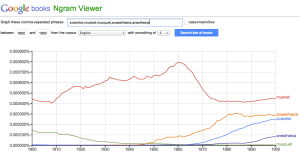
I don’t tell many people this, so consider yourselves lucky. I have my super-secret time machine whirring to life in the garage, so why don’t you join me on a trip? We can travel back into the 19th century to investigate three common words, how their usage began or changed during those hundred years, and potential reasons why this was the case.
After we hide the Delorean, our work can begin. I chose musket (or musquet), anesthesia (or anaesthesia), and scientist, hoping that these three words would provide some interesting results from Google Ngrams. I set the years for 1800 to 1900, and settled on a smoothing of 5. The lower the smoothing number, the more jagged of a graph would be produced.
Musket is a word that refers to a type of infantry gun, and it had French origins from the 16th century. There were many spellings throughout the centuries, which is why I included the most popular alternate spelling. From 1800 to around the start of the Civil War, its usage almost doubled. In this same period of time, musquet was about 1/4 as popular as musket by 1800, and it had basically stopped being used by 1860. This coincides with a sharp decline in musket after 1860 as well. According to Oed.com, musket was reserved for obsolete weapons, while the more common rifle was adopted for contemporary firearms.
Next, I wanted to find a word whose usage began during the 19th century, and I settled upon anesthesia, which is generally spelled anaesthesia in Britain. Both versions were included in the search, and it is derived from Latin. Prior to 1840, there is practically no use of anaesthesia, yet thanks to the Oxford English Dictionary, we can see the use increased greatly for the remainder of the 19th century, peaking in the 1880s. The American version, anesthesia, slowly grew in usage towards 1900, but was still well below the British spelling. Of course, this word coincided with better medical technology, especially during the Civil War in the United States.
Finally, I chose another word, scientist, which I expected to rise in usage throughout the century. The slope of the graph grows slowly from the 1860s, possibly in response to Charles Darwin, who published On the Origin of Species in 1859. The Oxford Dictionary helps elucidate the origin of the word scientist, as W. Whewell stated in 1834:
…the want of any name by which we can designate the students of the knowledge of the material world collectively. We are informed that this difficulty was felt very oppressively by the members of the British Association for the Advancement of Science, at their meetings..in the last three summers… Philosophers was felt to be too wide and too lofty a term,..; some ingenious gentleman proposed that, by analogy with artist, they might form scientist…
More succinctly, in 1834 a gentleman compared art and science, and if someone who practices art is an artist, then a practitioner of science should be a scientist. This is how scientist became a word, and Ngrams shows its usage grew by about 10 times from 1870 to 1900.
Ok, its time to go…you get to choose the time machine destination this time, though.
